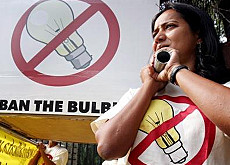Swiss scientists join in climate alarm call

More than 200 top climate scientists from around the globe, gathered in Bali, have called for urgent action to cut greenhouse gas emissions.
They called on participants in the United Nations Climate Conference in Indonesia to reduce levels by at least 50 per cent from their 1990 levels, by the year 2050.
Among the signatories are ten researchers from Switzerland, including eight who helped compile this year’s report by the Intergovernmental Climate Change Panel.
The researchers are urging conference participants to negotiate a deal by 2009 to limit global warming to no more than two degrees Celsius above the pre-industrial temperature.
“If we want to achieve this goal, we have to stop the rise in CO2 emissions within ten years at the latest,” commented Reto Knutti, a signatory from the Institute for Atmosphere and Climate at the Federal Institute of Technology in Zurich.
Researchers have detected a warming of 0.8 degrees, with a further 0.5-degree increase on the horizon, Knutti noted. “There is therefore not much more room for manoeuvre.”
In a joint declaration the scientists from more than 25 countries said that governments only had a window of ten-15 years for global emissions to peak and decline.
Kyoto replacement
The meeting in Bali, involving around 190 countries including Switzerland, aims to start a two-year dialogue leading to a broader climate pact by 2009 to replace or upgrade the Kyoto Protocol on climate change, which expires in 2012.
Delegates are aiming to find a formula that would bring non-signatories, including the United States, China and India, into a global deal to fight growing emissions of carbon dioxide.
The US, the world’s largest CO2 emitter, has come under intense pressure from all sides at Bali to curb its emissions.
On Wednesday the country’s parliamentarians moved a step closer to approving limits when a Senate committee approved a cap-and-trade system for industry, power generators and transport.
Switzerland’s priority at Bali is to put the focus on the big greenhouse gas emitters.
The head of the Swiss negotiating delegation in Bali, Thomas Kolly, told swissinfo before the meeting that the emerging countries and the US should be included in the system that applies from 2012. He said the signs were positive for US participation.
New Australian Prime Minister Kevin Rudd earlier this week signed documents to ratify the Kyoto Protocol, leaving the US isolated as the only industrialised country not to have signed the agreement.
swissinfo with agencies
The Swiss parliament ratified the Kyoto Protocol on climate change in 2003. Switzerland undertook to reduce its CO2 emissions to 10% less than 1990 levels by 2010.
However, some experts are doubtful that this target will be met. In 1990 greenhouse gas emissions stood at 53.3 million tonnes; in 2000 they were 52.7.
A CO2 law came into force in 2000 to ensure that the Kyoto target was achieved. About a thousand enterprises have taken voluntary measures measures to reduce their emissions.
But it became clear by 2005 that these measures were not sufficient. It is proving difficult, however, to agree on how to strengthen them.
Andreas Fischlin, Director Terrestrial Systems Ecology, Federal Institute of Technology in Zurich.
Jacqueline Flückiger, Research Scientist.
Joos Fortunat, Professor.
Nicolas Gruber, Professor.
Gerald Haug, Professor.
Reto Knutti, Professor.
Ulrike Lohmann, Professor.
Gian-Kasper Plattner.
Christoph Schär, Professor in Atmospheric Sciences, Federal Institute of Technology in Zurich.
Thomas Stocker, Professor.

In compliance with the JTI standards
More: SWI swissinfo.ch certified by the Journalism Trust Initiative












You can find an overview of ongoing debates with our journalists here . Please join us!
If you want to start a conversation about a topic raised in this article or want to report factual errors, email us at english@swissinfo.ch.